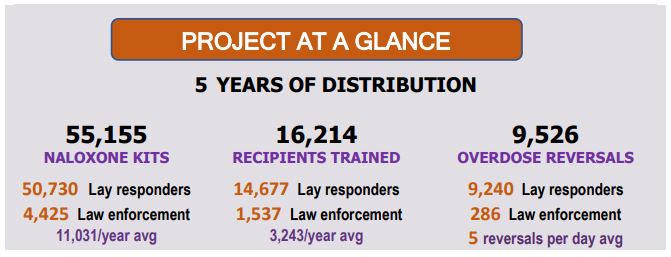New Report: WA State Project to Prevent Prescription Drug/Opioid Overdose: Final Report on Naloxone Distribution
11/30/2021The Washington State Project to Prevent Prescription Drug/Opioid Overdose (WA-PDO) was a five-year project supported by the WA State Health Care Authority/Division of Behavioral Health and Recovery with funds from the Substance Abuse and Mental Health Services Administration. The goal of the project was to prevent opioid overdose in WA State by building a statewide network for overdose prevention and response training and naloxone distribution.
The project was implemented by the UW Addictions, Drug & Alcohol Institute (ADAI), Department of Psychiatry & Behavioral Sciences, in partnership with five organizations who served as regional coordinators for project activities: Blue Mountain Heart to Heart, Walla Walla; Dave Purchase Project, Tacoma; Grays Harbor County Public Health & Social Services, Aberdeen; Phoenix Recovery/Pioneer Human Services, Mt Vernon; Spokane Regional Health District, Spokane.
This new report describes the results of the WA-PDO’s naloxone distribution efforts, with a particular emphasis on naloxone distribution among people who use opioids and law enforcement.

Some of the key lessons learned:
- Concentrating naloxone distribution through syringe service programs is an effective and productive strategy to reach people with the highest risk of having or witnessing an overdose.
- People who use opioids readily share what they’ve learned with peers and actively promote overdose prevention messaging and skills building within their communities.
- Distributing naloxone to people who use drugs is a worthwhile investment of public health resources
- Overdose training and naloxone distribution can leverage and support collaborative relationships between harm reduction programs and law enforcement.
- Law enforcement resistance or ambivalence about their role in overdose response and in addressing opioid use in the community can soften with appropriate training, resources, and administrative and leadership support.
The WA-PDO project recently received renewal funding through 2026 and is now administered by the WA State Department of Health: WA State DOH Overdose Education and Naloxone.





